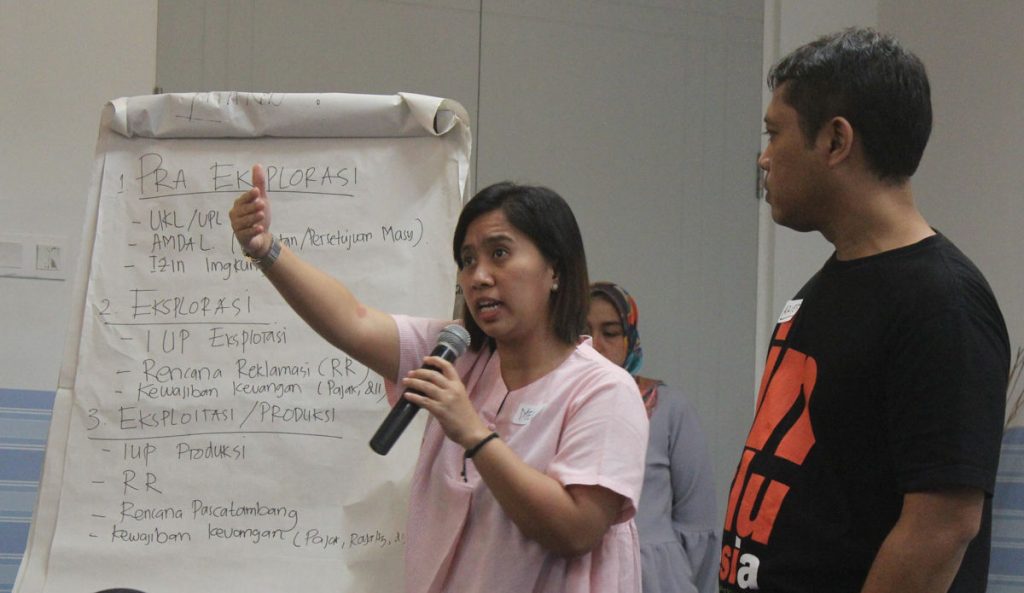Novi, not her real name, was an illegal miner. Now, she is surprisingly interested in participating in overseeing mining activities around where she lives, in Central Lombok Regency, West Nusa Tenggara Province (NTB).
Novi’s ex-husband had a one-hectare hilly land near their home. In 2012, he decided to clear the land. He planned to turn the land into a paddy field. Hence cut down all the trees there. He offered everyone, including pottery and clay roof tile business owners, to excavate the hilly land and buy the dirt and clay. Novi said, if they didn’t do that, “the irrigation water would not be able to water down the paddy field.”
“Besides, the demand for dirt and clay were high. It is for making red bricks,” she added. Novi and her ex-husband received IDR 25,000, or approximately USD 2.5 at that time, for one truckload of dirt.
In the village where Novi used to live, there were a dozen illegal miners. They mined dirt, sand, rocks, and clay. Three to five dump trucks carrying those mining products went in and out of the village every day and damaged the road.
Some neighbors had confronted Novi’s ex-husband for the damage caused and asked him to stop the mining activities. Novi said, her ex-husband responded to the complaints, saying that the land is his therefore he has the right to do whatever he wants with it.
Novi did not fully support the illegal mining activities. Since they cut down the trees and mined the land, the well in her house was always dry during the dry season. She admitted, it never happened before. Yet, she never complained or shared her concern with her ex-husband. “It was not my land after all. I had no right. So, I just followed my ex’s will,” she revealed.
The mining activities stopped in 2014, after the hillocks in the land was leveled. In two years of mining, only a few people dared to complain directly to Novi’s ex-husband for the damaged road. She said, he was a respected man in the village. Those who were reluctant to protest to the ex-husband would express their objections to Novi. “I told them not to nag to me but my husband. I had no right and power to stop it [the mining activities].”
Monitoring Mining Operations
Novi is a social science teacher in a junior and senior high school in Central Lombok Regency. She is also a member of the Village Community Forum and a human development cadre in the village where she currently lives.
Novi started her journey monitoring mining operations in Central Lombok after participating in the Training on Mining Activity Monitoring for the Community in West Nusa Tenggara Province organized by the Transparency Society of West Nusa Tenggara (SOMASI NTB) and Publish What You Pay (PWYP) Indonesia on 21 November 2019. Riding a motorbike with her friend, Novi visited seven mining locations at different times, from 29 November to 1 December 2019.

What encourages her to oversee mining activities is her curiosity to understand the impact of mining on people’s lives, if it gives benefits to the people or the opposite. As a human development cadre, she also wants to know how the activities affect the children’s growth and development who live near mining areas. Moreover, she wants to see mining activities and environmental damages it creates with her own eyes.
Novi was sad when she witnessed the environmental damage near the mining areas she visited. Based on her observations, half of Mount Prabu, illegal gold mining in Pujut Sub-district, Central Lombok Regency, is barren and has no trees. In another location, in Pringrata Sub-district, Novi found sand and gravel quarries near a residential area. She spotted numerous heavy equipment to excavate the sand and dig out the pumice in the area. She also saw several mining pits with 20 meters depth (approximately).
She did not face significant challenges while monitoring mining operations. She visited the mining locations in the morning when no one was there to be freer to observe the area. However, there was a time when some locals in Patre, West Praya Sub-disctrict approached her and asked why she came. “People living near the mining area are more suspicious of strangers. To avoid their suspicion, I told the locals that I wanted to buy gravels and resell them. And, I didn’t take any pictures there,” she recalled.
Novi has no problem riding her motorbike by herself for tens of kilometers to monitor mining operations. She has no plan to stop yet. She hopes, the local government would follow up her findings and be more active in conducting the monitoring, including investigating if there is any quarry is located close to residential areas or other public facilities. She urges the government to find out whether the citizens understand the negative impact of mining or not. The government must also be more firm in cracking down on the violations. “If we don’t do anything, what about our future generations, our children and grandchildren? They won’t be able to have and enjoy a healthy environment and beautiful nature if we keep exploiting it,” she asserted.
The original version of this article was published earlier on SOMASI NTB’s website. Click here to read it.
*) The name and location of the village in this article are disguised to maintain the security and privacy of the resource persons